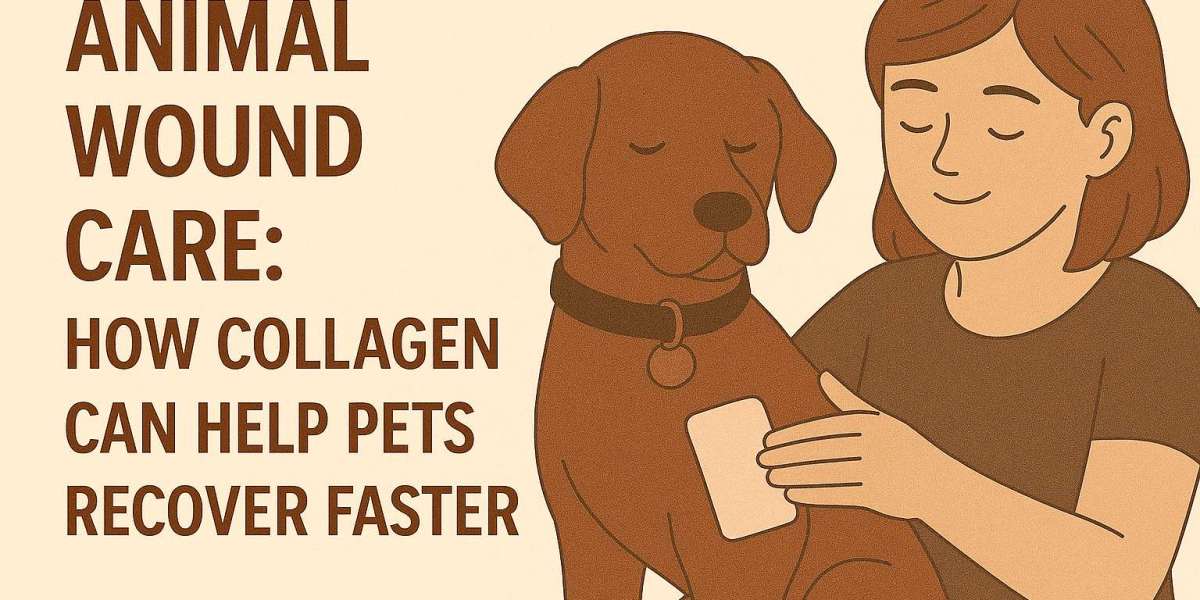Collagen and Pet Wound Healing: Supporting Faster Recovery for Your Furry Friends
When our pets suffer from wounds—whether due to surgery, injury, or chronic skin conditions—watching them struggle through the healing process can be stressful. Just like in humans, effective wound care is essential for preventing complications and promoting faster recovery in animals. One solution that’s gaining attention in veterinary medicine is the use of medical-grade collagen in animal wound care.
While collagen has long been used in human wound treatments, it’s now making its way into veterinary practices—and for good reason. Let’s take a closer look at how collagen supports healing and why it’s becoming a go-to option for helping pets recover more quickly.
Understanding Collagen and Its Role in Healing
Collagen is an important protein distributed within the body’s connective tissues, such as the skin, tendons, and ligaments. It helps maintain tissue strength and flexibility while playing an important role in the body’s natural repair and healing processes. During wound healing, collagen serves as a biological scaffold, guiding the growth of new tissue and promoting cell migration to the injury site.
In animals, just as in humans, wound healing involves several stages: inflammation, tissue formation, and remodeling. When these phases are disrupted—whether due to infection, poor blood flow, or other health conditions—healing can slow down. This is where collagen-based wound care products come into play.
Benefits of Collagen in Animal Wound Healing
1. Promotes Faster Tissue Regeneration
Applying medical-grade collagen directly to a pet’s wound provides an external source of this vital protein. This helps jump-start the healing process by creating an environment that supports the growth of new skin, blood vessels, and connective tissue.
2. Supports Chronic and Hard-to-Heal Wounds
Some pets, especially older animals or those with underlying health issues like diabetes, may struggle with chronic wounds that don't heal properly. Collagen dressings can help by encouraging cellular activity and tissue repair in areas where healing has stalled.
3. Helps Manage Moisture Balance
A moist wound environment is important for healing, but too much moisture can increase the risk of infection. Several collagen-based dressings are designed to absorb surplus wound fluid while preserving the moist environment essential for effective tissue repair and regeneration.
4. Reduces Scarring and Tissue Breakdown
Collagen can help regulate the breakdown of damaged tissue while minimizing excessive scar formation. This is especially important for pets with wounds in visible areas where owners may want to reduce scarring for aesthetic or functional reasons.
5. Biocompatibility and Safety
Medical-grade collagen products are typically derived from sources such as bovine (cow) or porcine (pig) tissue and undergo strict purification processes to ensure they’re safe for use on animals. These products are formulated to work safely with the body’s tissues, helping to minimize the chance of allergic responses or other adverse effects.
Different Forms of Collagen Products in Veterinary Wound Care
Collagen for animal wound care comes in various forms, including:
- Collagen powders – Easily sprinkled over open wounds.
- Collagen sheets or pads – Applied as a dressing to cover larger or deeper wounds.
- Collagen gels – Ideal for covering wounds with uneven or hard-to-reach surfaces.
Selecting the appropriate product is based on factors like the wound’s size, depth, location, and the specific treatment approach recommended by the veterinarian.
When to Consider Collagen for Your Pet’s Wound
Not every wound requires a collagen dressing. Minor scrapes and superficial wounds usually heal well with basic cleaning and monitoring. However, collagen-based treatments are often recommended for:
- Surgical incisions
- Deep cuts or lacerations
- Pressure sores
- Chronic or non-healing wounds
- Burns or severe abrasions
A veterinarian can examine the wound’s condition and determine the most appropriate treatment plan for your pet’s recovery.
Conclusion
Collagen is gaining recognition as a beneficial addition to veterinary wound care, providing a safe and effective method to promote quicker healing and better recovery in pets. By helping stimulate new tissue growth, manage moisture, and reduce the risk of complications, collagen-based products are giving veterinarians and pet owners alike a new level of confidence in wound management.
If your furry friend is dealing with a difficult wound, ask your vet if collagen-based treatments could be the right option. With the right care and support, pets can heal faster and get back to living their happiest, healthiest lives.



